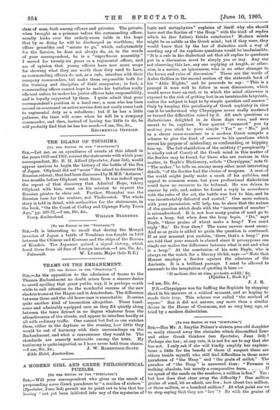A MODERN GIRL AND GREEK PHILOSOPHICAL PUZZLES.
[TO TIM EDITOR OP TRH " SPROTATOR:] SIR,—Will your correspondent who gives us the result of propounding some Greek paradoxes to "a maiden of sixteen" (Spectator, Juno 3rd) permit me to point out to him that her having "not yet been initiated into any of the mysteries of logic and metaphysics" explains of itself why she should have met the Sorites of "the Heap" with the kind of replies which be (her father) thinks conclusive ? Modern minds might be as subtle as the Greek mind; but if they were, they would know that by the law of dialectics such a way of meeting any of its captions questions would be inadmissible. "It is a rule in the dialectical art that all replies to questions put in a discussion must be simply yea or nay. Any one not observing this law, any one replying at length, or other. wise, is a novice, an ignoramus, who is an utter stranger to the forms and rules of discussion." These are the words of Aulus Gellius in the second section of the sixteenth book of his "Attic Nights," and he proceeds to say : "This is a precept it were well to follow in most discussions, which would never have an end, or in which the mind otherwise is exposed to the risk of getting lost in an inextricable labyrinth, unless the subject is kept to by simple question and answer." Only by keeping this peculiarity of Greek sophistry in view can it be understood why Chrysippus never really mastered or turned the difficulties raised by it. All such questions as dialecticians delighted in in those days were, and were meant to be, captious. Your querist " cornered " you by making you stick to your simple " Yes " or "No," just as a clever croas-examiner in a modern Court compels a witness to give the kind of answer to his questions which serves his purpose of misleading, or confounding, or tripping him up. The full elucidation of the subtlety (" perspicacity" is wholly out of Court) of the Greek mind in this matter of the Sorites may be found, for those who are curious in this matter, in Bayle's Dictionary, article " Chrysippus," note 0. "The maker," he tells us, among many other most interesting details, "of the Sorites had the choice of weapons. A man of the world might justly make a mock of his quibbles, and appeal to common sense, but your professional dialectician could have no recourse to its tribunal. Ho was driven to answer by rule, and, unless he found a reply in accordance with the rules of the art, the battle was lost to him, and he was incontestably defeated and routed." One more extract, with your permission, will help, too, to show that the nature of the question which deals with the "increment of number" is misunderstood. It is not how many grains of sand go to make a heap, but when does the heap begin. "Do," says Bayle, "three grains of wheat make a heap ? You must reply No.' Do four then ? The same answer must ensue. And so as grain is added to grain the question is continued. If at any moment you exclaim, there, that's a heap !' you are told that your remark is absurd since it presupposes one single ear makes the difference between what is not and what is a heap." At the conclusion of his note Bayle, who is always on the watch for a literary tit-bit, says :—" Note that Horace employs a Sorites against the admirers of the Ancients. It is a brilliant passage. I must be allowed to succumb to the temptation of quoting it here :- 'Si meliora dies ut via, poemats, reddit,' &c.
(Epistles I., Book 2.) " P.S.--Chrysippus was for baffling the Sophists by stopping short in his answers at a critical moment, and so hoping to evade their trap. This scheme was called "the method of repose." But it did not answer, any more than a similar device in the House of Commons, not so very long ago, as tried by a modern dialectician.






































 Previous page
Previous page